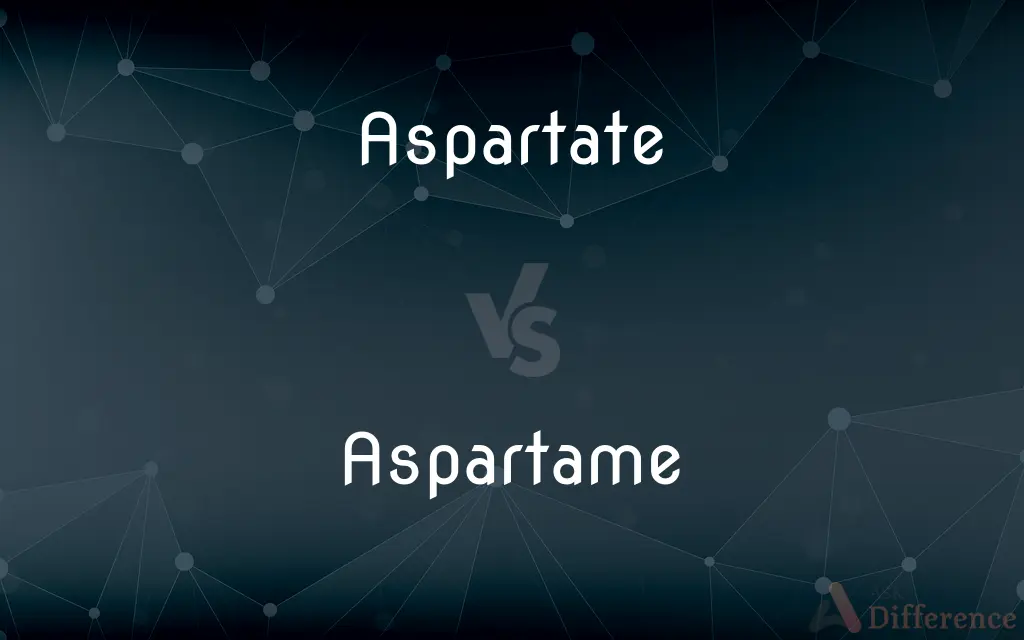Aspartate vs. Aspartame — What's the Difference?
Edited by Tayyaba Rehman — By Fiza Rafique — Updated on March 22, 2024
Aspartate is an amino acid involved in the body's metabolic processes, while aspartame is an artificial sweetener derived from aspartate and phenylalanine.

Difference Between Aspartate and Aspartame
Table of Contents
ADVERTISEMENT
Key Differences
Aspartate plays a crucial role in the urea cycle and neurotransmitter synthesis, contributing to the body's protein synthesis and energy production. On the other hand, aspartame is a low-calorie sweetener used in many sugar-free and diet products, offering sweetness without the high caloric content of sugar.
Aspartate is naturally occurring in the body and in various foods, including meats, grains, and dairy products, where it functions as a building block for proteins. Aspartame, however, is synthetically created and used primarily as a food additive to enhance sweetness without adding bulk or significant calories.
The consumption of aspartate is generally considered safe and necessary for health, as it supports numerous bodily functions. Whereas the consumption of aspartame has been a topic of debate, with concerns over its safety and potential health effects, although regulatory agencies consider it safe for most people when consumed within limits.
Aspartate can also act as a neurotransmitter in the brain, playing roles in the nervous system's functioning. Aspartame, after ingestion, is broken down into its component parts, including aspartate, but its consumption does not significantly affect neurotransmitter levels due to its low concentration.
While aspartate is vital for health and involved in many metabolic pathways, aspartame's role is primarily as a dietary substitute for sugar, aimed at reducing caloric intake and managing weight or blood sugar levels.
ADVERTISEMENT
Comparison Chart
Nature
Amino acid
Artificial sweetener
Role in Body
Metabolic processes, neurotransmitter
Sweetening without adding calories
Source
Naturally occurring in foods
Synthetically manufactured
Health Impact
Essential for health, involved in many pathways
Debated but approved for use within certain limits
Usage
Nutritional component of proteins
Food additive in sugar-free and diet products
Compare with Definitions
Aspartate
Amino acid important in the biosynthesis of proteins.
Aspartate is one of the non-essential amino acids in humans.
Aspartame
Subject of health debates.
Studies have investigated aspartame's potential health effects, but it remains approved for use.
Aspartate
Component of the urea cycle.
Aspartate contributes to the elimination of nitrogen waste.
Aspartame
Derived from aspartate and phenylalanine.
Aspartame breaks down into its amino acid components when ingested.
Aspartate
Found in various foods.
Aspartate levels are high in poultry, beef, and avocado.
Aspartame
Artificial sweetener.
Aspartame is commonly found in diet sodas.
Aspartate
Involved in neurotransmitter synthesis.
Aspartate can act as an excitatory neurotransmitter.
Aspartame
Used in many diet and sugar-free products.
Sugar-free gum often contains aspartame.
Aspartate
Necessary for mitochondrial function.
Aspartate aids in energy production within cells.
Aspartame
Low-calorie sugar substitute.
Aspartame offers sweetness without the calories of sugar.
Aspartate
A salt or ester of aspartic acid.
Aspartame
An artificial sweetener, C14H18N2O5, whose metabolic breakdown products include aspartic acid and phenylalanine. It must be avoided by people with phenylketonuria.
Aspartate
(organic compound) Any salt or ester of aspartic acid.
Aspartame
Aspartame is an artificial non-saccharide sweetener 200 times sweeter than sucrose, and is commonly used as a sugar substitute in foods and beverages. It is a methyl ester of the aspartic acid/phenylalanine dipeptide with the trade names NutraSweet, Equal, and Canderel.
Aspartame
(organic compound) An artificial sweetener, the methyl ester of a dipeptide formed from aspartic acid and phenylalanine, used in many processed foods and beverages.
Aspartame
An artificial sweetener containing an aspartic acid peptide, (C14H18N2O5); it is 160 times sweeter than sucrose (cane sugar) and is used as a calorie-free sweetener. Chemically it is N-L-
Aspartame
An artificial sweetener made from aspartic acid; used as a calorie-free sweetener
Common Curiosities
What is aspartate?
Aspartate is an amino acid involved in protein synthesis and metabolic processes.
Is aspartame derived from aspartate safe to consume?
Yes, aspartame is considered safe for consumption within regulated limits.
What is aspartame?
Aspartame is an artificial sweetener made from aspartate and phenylalanine.
How does the body use aspartate?
The body uses aspartate in protein synthesis, neurotransmitter production, and the urea cycle.
Can everyone consume aspartame safely?
Most people can, but individuals with phenylketonuria (PKU) should avoid it due to its phenylalanine content.
Are aspartate and aspartame the same?
No, aspartate is an amino acid, while aspartame is a sweetener derived from aspartate.
Can aspartate act as a neurotransmitter?
Yes, aspartate can act as an excitatory neurotransmitter in the brain.
Why is aspartame used in food products?
Aspartame is used to sweeten foods without adding calories, beneficial for weight management and diabetes.
Where is aspartate found?
Aspartate is found in various foods, including meats, grains, and dairy.
What are the potential health concerns with aspartame?
Some concerns include potential neurological effects and metabolic changes, though evidence is mixed.
How is aspartate synthesized in the body?
Aspartate is synthesized through transamination reactions involving other amino acids.
Is aspartate essential for human health?
Yes, aspartate plays several vital roles in metabolic processes and neurotransmission.
Does aspartate contribute to the urea cycle?
Yes, aspartate is a critical component of the urea cycle, which helps eliminate nitrogenous wastes.
How does aspartame compare to sugar in terms of calories?
Aspartame has significantly fewer calories than sugar, making it a popular choice for low-calorie diets.
What are the benefits of using aspartame over sugar?
Benefits include lower calorie intake, reduced risk of dental cavities, and suitability for diabetics.
Share Your Discovery

Previous Comparison
Restoration vs. Recovery
Next Comparison
Perseverance vs. CuriosityAuthor Spotlight
Written by
Fiza RafiqueFiza Rafique is a skilled content writer at AskDifference.com, where she meticulously refines and enhances written pieces. Drawing from her vast editorial expertise, Fiza ensures clarity, accuracy, and precision in every article. Passionate about language, she continually seeks to elevate the quality of content for readers worldwide.
Edited by
Tayyaba RehmanTayyaba Rehman is a distinguished writer, currently serving as a primary contributor to askdifference.com. As a researcher in semantics and etymology, Tayyaba's passion for the complexity of languages and their distinctions has found a perfect home on the platform. Tayyaba delves into the intricacies of language, distinguishing between commonly confused words and phrases, thereby providing clarity for readers worldwide.















































